Ward A.W. The Cambridge History of British Foreign Policy. 1783-1919. Volume 3
Подождите немного. Документ загружается.

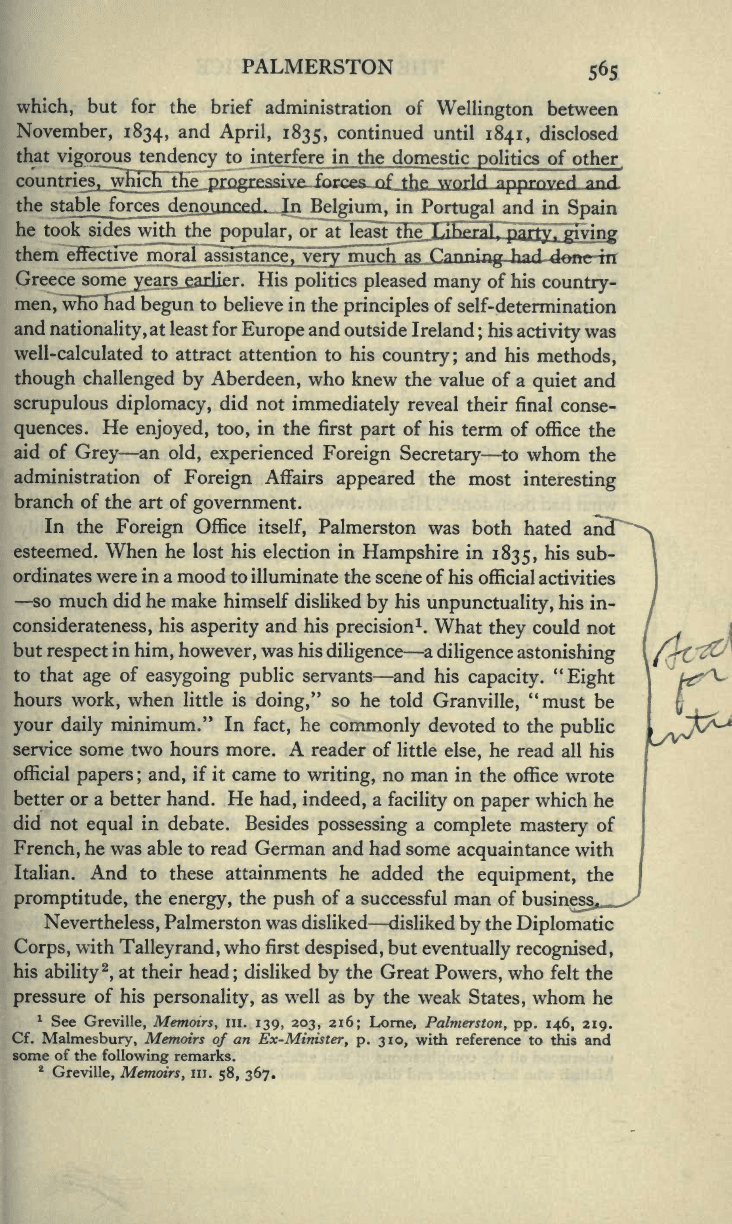
PALMERSTON
S6S
which,
but
for
the
brief
administration of
Wellington
between
November,
1834,
and
April,
1835,
continued
until
1841,
disclosed
that
vigorous
tendency
to
in
terfere in
the
domestic
politics
of
other
countri
es/wKich
the
progressive forces .of
t
he
wor
ld
apprnvpH
anH
the
stable
forces
dejiounmL
.. In
Belgium,
in
Portugal
and
in
Spain
he took sides
jyjthjjhe^
popular,
p
ratleasMjiejU
r^i^
p
Vrty7g?
vl
*
n
g
them
effective moral
as
sistance
,
very
much as C
anning
had
4ftnr-rn
Greece
some
years^arJier.
His
politics
pleased
many
of
his
country-
men,
wKcThad
begun
to
believe in
the
principles
of
self-determination
and
nationality,
at least for
Europe
and
outside Ireland
;
his
activity
was
well-calculated
to
attract
attention
to
his
country;
and
his
methods,
though
challenged
by
Aberdeen,
who
knew
the value of
a
quiet
and
scrupulous
diplomacy,
did
not
immediately
reveal
their final
conse-
quences.
He
enjoyed,
too,
in
the
first
part
of
his
term of
office
the
aid
of
Grey
—
an
old,
experienced
Foreign
Secretary
—
to whom
the
administration of
Foreign
Affairs
appeared
the
most
interesting
branch of
the art
of
government.
In
the
Foreign
Office
itself,
Palmerston was
both
hated ancT
esteemed. When he
lost
his
election
in
Hampshire
in
1835,
his
sub-
ordinates
were
in
a mood
to illuminate
the scene of
his official
activities
—
so much did
he make
himself
disliked
by
his
unpunctuality,
his
in-
considerateness,
his
asperity
and
his
precision
1
.
What
they
could
not
but
respect
in
him,
however,
was
his
diligence
—
a
diligence
astonishing
to that
age
of
easygoing public
servants
—
and
his
capacity.
"Eight
hours
work,
when
little
is
doing,"
so he
told
Granville,
"must be
your
daily
minimum.
"
In
fact,
he
commonly
devoted
to the
public
service some
two
hours
more. A
reader of
little
else,
he
read all
his
official
papers;
and,
if
it came
to
writing,
no
man
in
the office
wrote
better
or a
better
hand.
He
had,
indeed,
a
facility
on
paper
which he
did
not
equal
in
debate. Besides
possessing
a
complete
mastery
of
French,
he was able
to
read
German and had
some
acquaintance
with
Italian.
And
to
these attainments
he
added
the
equipment,
the
promptitude,
the
energy,
the
push
of a
successful
man
of
business,
Nevertheless,
Palmerston
was
disliked
—
disliked
by
the
Diplomatic
Corps,
with
Talleyrand,
who
first
despised,
but
eventually
recognised,
his
ability
2
,
at their
head;
disliked
by
the
Great
Powers,
who
felt
the
pressure
of his
personality,
as well as
by
the weak
States,
whom
he
1
See
Greville, Memoirs,
III.
139, 203,
216;
Lome,
Palmerston,
pp.
146,
219.
Cf.
Malmesbury,
Memoirs
of
an
Ex-Minister,
p. 310,
with reference
to this and
some of
the
following
remarks.
2
Greville,
Memoirs,
111.
58, 367.
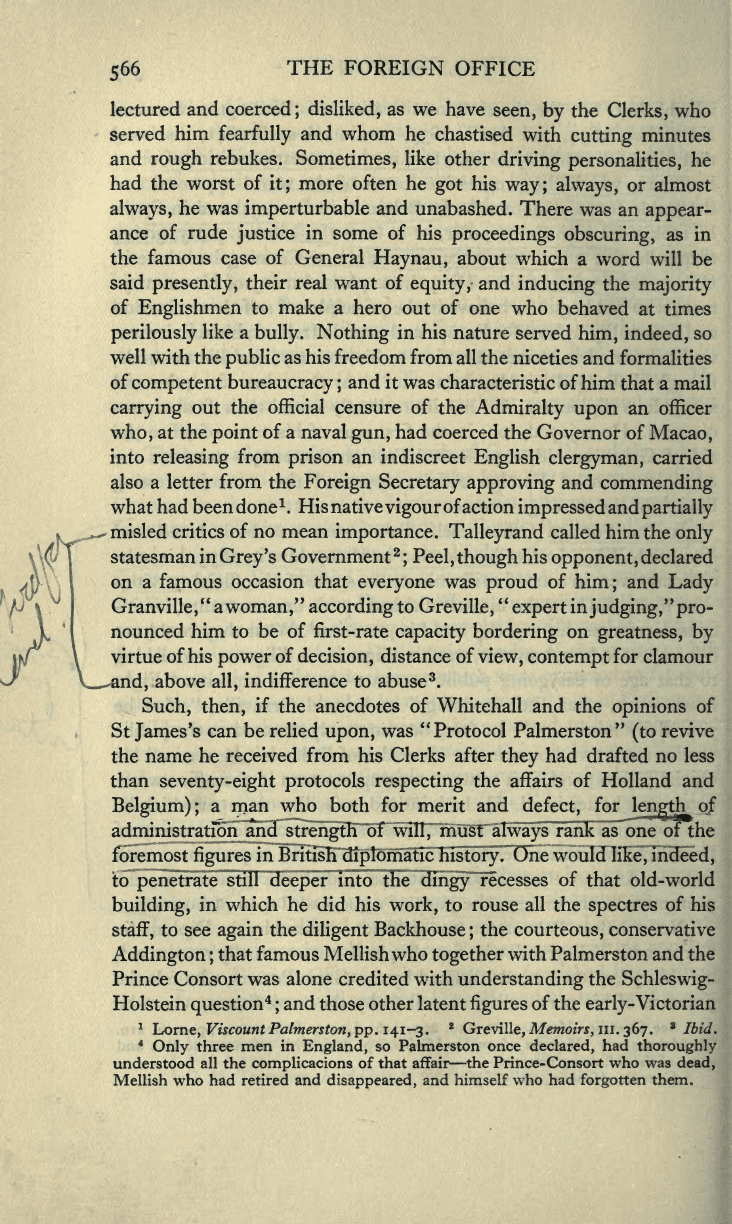
566
THE
FOREIGN
OFFICE
lectured
and
coerced;
disliked,
as we
have
seen,
by
the
Clerks,
who
served
him
fearfully
and whom
he
chastised
with
cutting
minutes
and
rough
rebukes.
Sometimes,
like
other
driving
personalities,
he
had
the worst
of
it;
more
often he
got
his
way;
always,
or
almost
always,
he was
imperturbable
and
unabashed.
There
was
an
appear-
ance
of rude
justice
in
some of his
proceedings
obscuring,
as in
the
famous case
of General
Haynau,
about
which
a
word
will be
said
presently,
their
real
want
of
equity,
and
inducing
the
majority
of
Englishmen
to make a hero
out
of
one who
behaved
at
times
perilously
like a
bully. Nothing
in his
nature
served
him,
indeed,
so
well
with
the
public
as his
freedom from
all
the
niceties
and
formalities
of
competent bureaucracy
;
and
it was
characteristic
of
him
that
a mail
carrying
out the official censure of
the
Admiralty upon
an
officer
who,
at the
point
of a
naval
gun,
had
coerced
the
Governor of
Macao,
into
releasing
from
prison
an
indiscreet
English
clergyman,
carried
also a letter
from
the
Foreign
Secretary
approving
and
commending
what
had been done
1
.
His
native
vigour
of
action
impressed
and
partially
misled
critics
of no mean
importance.
Talleyrand
called him
the
only
statesman
in
Grey's
Government
2
;
Peel,
though
his
opponent,
declared
on
a
famous
occasion
that
everyone
was
proud
of
him;
and
Lady
Granville," awoman,"
according
to
Greville,
"
expert
in
judging,"
pro-
nounced
him
to
be
of
first-rate
capacity
bordering
on
greatness,
by
virtue
of his
power
of
decision,
distance of
view,
contempt
for
clamour
nd,
above
all,
indifference
to
abuse
3
.
Such,
then,
if
the anecdotes
of
Whitehall
and
the
opinions
of
St
James's
can
be relied
upon,
was
"Protocol
Palmerston"
(to
revive
the
name he
received from his Clerks
after
they
had drafted
no less
than
seventy-eight
protocols
respecting
the
affairs of Holland and
Belgium)
;
a man who
both
for
merit
and
defect,
for
length
of
administration
and
strength
of
will,
must
always
rank
as one
oFthe
foremost
figures
in British
diplomatic history'.'
One would
like,
indeed,
to
penetrate
still
deeper
into
the
dingy
recesses
of
that
old-world
building,
in which he did his
work,
to
rouse all
the
spectres
of
his
staff,
to
see
again
the
diligent
Backhouse
;
the
courteous,
conservative
Addington
;
that
famous Mellishwho
together
with Palmerston
and
the
Prince Consort
was
alone
credited with
understanding
the
Schleswig-
Holstein
question
4
;
and
those
other
latent
figures
of
the
early-
Victorian
1
Lome,
Viscount
Palmerston,
pp.
141-3.
2
Greville,
Memoirs,
in.
367.
8
Ibid.
4
Only
three
men in
England,
so Palmerston once
declared,
had
thoroughly
understood
all
the
complicacions
of that affair
—
the Prince-Consort
who was
dead,
Mellish who
had retired and
disappeared,
and himself who
had
forgotten
them.
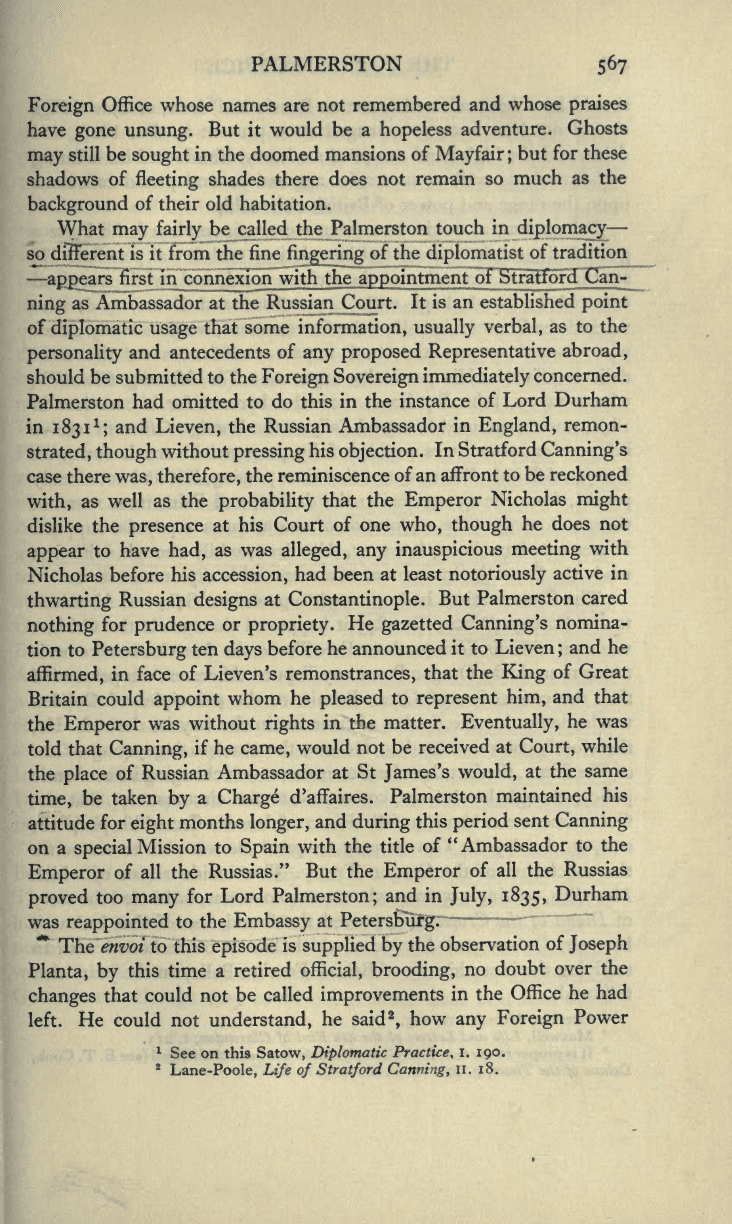
PALMERSTON
567
Foreign
Office whose
names
are
not remembered
and
whose
praises
have
gone unsung.
But it
would be a
hopeless
adventure.
Ghosts
may
still
be
sought
in
the
doomed mansions
of
Mayfair;
but
for these
shadows
of
fleeting
shades there does
not
remain
so
much
as the
background
of
their
old habitation.
What
may
fairly
be called the
Palmerston
touch
in
diplomacy
—
so
different
is
it
from
the
fine
fi
ngering
of
the
diplomatist
of
tradition
—
appears
first
in
connexi
on
with
the
appointment
of
Stratforo
TUan-
ning
as Ambassador
at the
Russian Court. It
is
an
established
point
of
diplomatic usage
that
some
information,
usually
verbal,
as
to
the
personality
and antecedents
of
any
proposed
Representative
abroad,
should
be
submitted
to
the
Foreign Sovereign
immediately
concerned.
Palmerston
had
omitted
to
do
this
in
the
instance
of Lord
Durham
in
1831
1
;
and
Lieven,
the
Russian
Ambassador
in
England,
remon-
strated,
though
without
pressing
his
objection.
In
Stratford
Canning's
case
there
was,
therefore,
the
reminiscence
of
an affront to
be reckoned
with,
as well
as
the
probability
that
the
Emperor
Nicholas
might
dislike the
presence
at
his Court
of one
who,
though
he
does
not
appear
to
have
had,
as was
alleged,
any
inauspicious
meeting
with
Nicholas before
his
accession,
had been
at
least
notoriously
active in
thwarting
Russian
designs
at
Constantinople.
But
Palmerston
cared
nothing
for
prudence
or
propriety.
He
gazetted
Canning's
nomina-
tion
to
Petersburg
ten
days
before
he
announced
it
to
Lieven
;
and he
affirmed,
in face
of Lieven's
remonstrances,
that
the
King
of Great
Britain
could
appoint
whom
he
pleased
to
represent
him,
and
that
the
Emperor
was without
rights
in
the
matter.
Eventually,
he was
told
that
Canning,
if
he
came,
would not
be
received at
Court,
while
the
place
of
Russian
Ambassador
at St
James's
would,
at the
same
time,
be taken
by
a
Charge
d'affaires.
Palmerston
maintained
his
attitude
for
eight
months
longer,
and
during
this
period
sent
Canning
on
a
special
Mission
to
Spain
with
the title
of
"
Ambassador
to the
Emperor
of
all
the
Russias."
But the
Emperor
of all the
Russias
proved
too
many
for
Lord
Palmerston;
and in
July,
1835,
Durham
was
reappointed
to
the
Embassy
at
Petersburg;"
The
envoi to this
episode
is
supplied by
the
observation
of
Joseph
Planta,
by
this time
a retired
official,
brooding,
no
doubt
over
the
changes
that
could not
be
called
improvements
in the
Office
he
had
left.
He could not
understand,
he
said
2
,
how
any
Foreign
Power
1
See on this
Satow,
Diplomatic
Practice,
I.
190.
2
Lane-Poole,
Life
of Stratford
Canning,
II.
18.
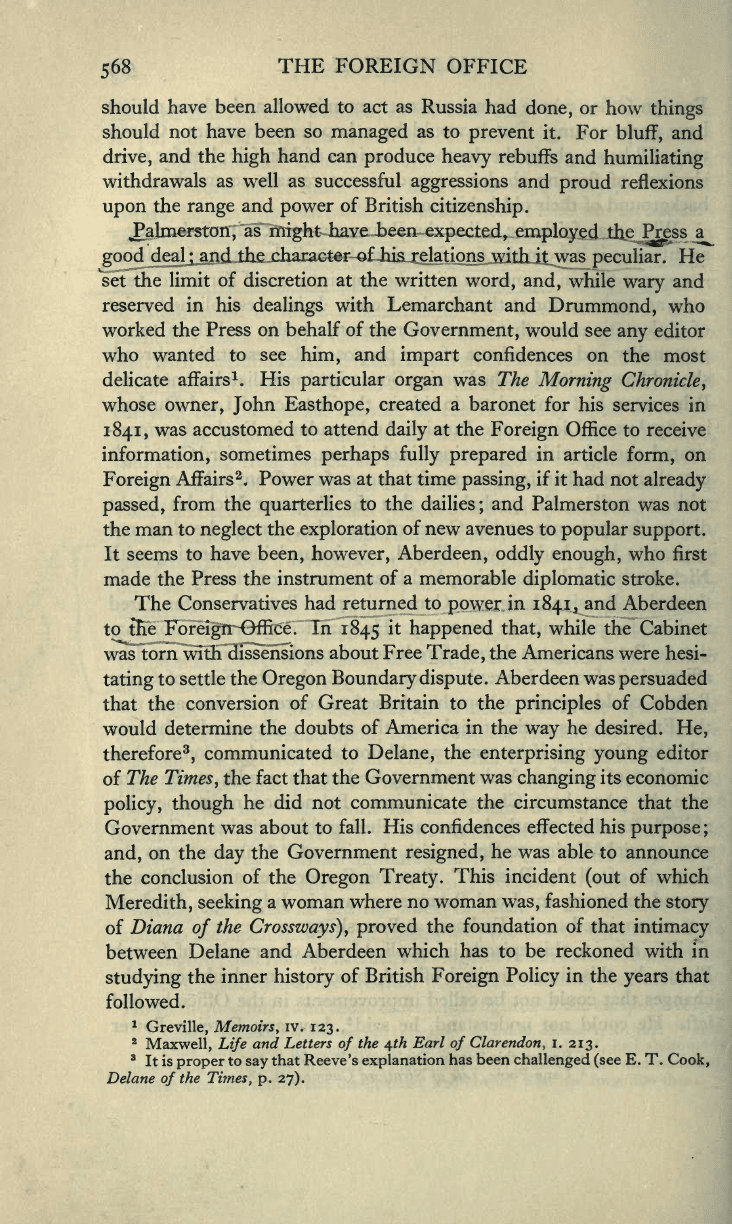
568
THE FOREIGN
OFFICE
should
have
been allowed
to act
as
Russia
had
done,
or
how
things
should
not
have been
so
managed
as
to
prevent
it.
For
bluff,
and
drive,
and the
high
hand can
produce
heavy
rebuffs
and
humiliating
withdrawals
as
well
as
successful
aggressions
and
proud
reflexions
upon
the
range
and
power
of
British
citizenship.
.Palmerston,
as
might
have
been
expected,
employed
the
Press a
good
deal
;
and the
character
of
his
relations
with it
was
peculiar.
He
set the limit
of
discretion
at the
written
word, and,
while
wary
and
reserved
in
his
dealings
with Lemarchant
and
Drummond,
who
worked the
Press on behalf
of
the
Government,
would
see
any
editor
who
wanted to
see
him,
and
impart
confidences
on
the
most
delicate
affairs
1
. His
particular organ
was The
Morning
Chronicle
,
whose
owner,
John
Easthope,
created
a
baronet
for his
services in
1
84
1,
was accustomed
to attend
daily
at the
Foreign
Office to
receive
information,
sometimes
perhaps fully prepared
in
article
form,
on
Foreign
Affairs
2
. Power
was at that
time
passing,
if
it had
not
already
passed,
from the
quarterlies
to the
dailies;
and
Palmerston was
not
the
man to
neglect
the
exploration
of
new avenues
to
popular support.
It
seems to
have
been, however, Aberdeen,
oddly enough,
who first
made
the
Press the instrument
of a
memorable
diplomatic
stroke.
The
Conservatives
had returned
to
power
in
1841,
and
Aberdeen
to the
Foreign
Office.
In
1845
it
happened
that,
while the
Cabinet
wasltorn
witlTaTs^nsions
about
Free
Trade,
the
Americans
were hesi-
tating
to settle
the
Oregon
Boundary dispute.
Aberdeen was
persuaded
that the
conversion
of
Great Britain
to
the
principles
of
Cobden
would
determine the
doubts
of America
in
the
way
he desired.
He,
therefore
3
,
communicated
to
Delane,
the
enterprising
young
editor
of
The
Times,
the
fact
that the
Government
was
changing
its
economic
policy,
though
he
did not
communicate
the circumstance
that the
Government
was
about
to
fall.
His confidences effected
his
purpose;
and,
on the
day
the
Government
resigned,
he was
able to announce
the
conclusion
of
the
Oregon
Treaty.
This
incident
(out
of which
Meredith,
seeking
a
woman
where
no
woman
was,
fashioned
the
story
of
Diana
of
the
Crossways),
proved
the foundation
of
that
intimacy
between
Delane
and Aberdeen
which
has
to
be
reckoned
with
in
studying
the
inner
history
of
British
Foreign Policy
in
the
years
that
followed.
1
Greville,
Memoirs,
iv.
123.
2
Maxwell,
Life
and Letters
of
the
4th
Earl
of
Clarendon,
1.
213.
8
It
is
proper
to
say
that Reeve's
explanation
has been
challenged
(see
E. T.
Cook,
Delane
of
the
Times,
p.
27).
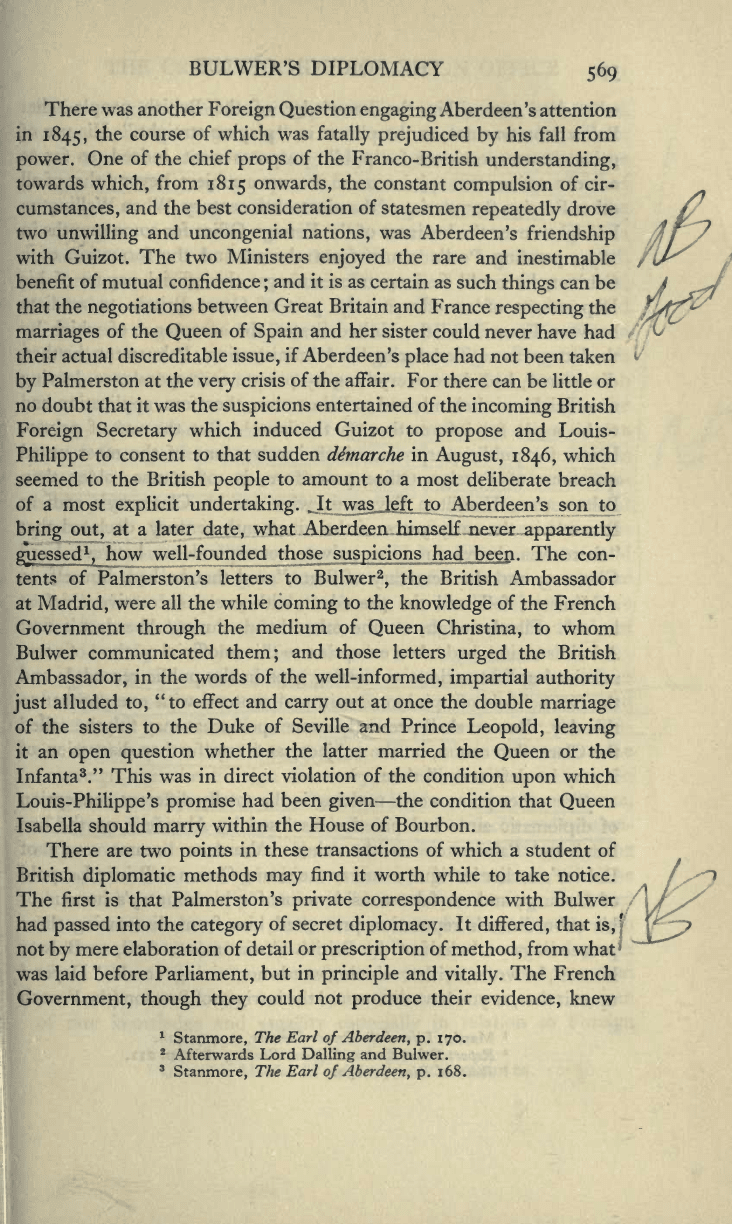
BULWER'S
DIPLOMACY
569
There
was another
Foreign
Question
engaging
Aberdeen's
attention
in
1845,
the
course
of
which
was
fatally
prejudiced
by
his
fall from
power.
One
of
the chief
props
of
the
Franco-British
understanding,
towards
which,
from 181
5
onwards,
the
constant
compulsion
of
cir-
cumstances,
and
the
best consideration
of
statesmen
repeatedly
drove
two
unwilling
and
uncongenial
nations,
was
Aberdeen's
friendship
with Guizot. The two
Ministers
enjoyed
the rare
and
inestimable
benefit
of
mutual confidence
;
and it
is as
certain as
such
things
can be
that
the
negotiations
between
Great Britain
and
France
respecting
the
marriages
of
the
Queen
of
Spain
and her
sister
could never
have had
their
actual discreditable
issue,
if Aberdeen's
place
had
not been
taken
by
Palmerston at the
very
crisis
of
the
affair. For
there
can
be
little
or
no
doubt that
it was the
suspicions
entertained of
the
incoming
British
Foreign Secretary
which
induced
Guizot to
propose
and
Louis-
Philippe
to consent
to that
sudden d-marche in
August,
1846,
which
seemed to
the
British
people
to
amount to
a
most
deliberate breach
of a
most
explicit
undertaking.
J[t
jvasjeft
to Aberdeen's son
to
bring
out,
at
a
later
date,
what Aberdeen himself
never
apparently
guessed
1
^
how well-founded
those
suspicions
had
been. The
con-
tents
of
Palmerston's
letters
to Bulwer
2
,
the
British
Ambassador
at
Madrid,
were
all
the
while
coming
to the
knowledge
of
the
French
Government
through
the medium
of
Queen
Christina,
to whom
Bulwer communicated
them;
and those
letters
urged
the British
Ambassador,
in
the words
of the
well-informed,
impartial
authority
just
alluded
to,
"to
effect
and
carry
out
at once the
double
marriage
of
the sisters
to the
Duke
of
Seville and
Prince
Leopold,
leaving
it
an
open question
whether
the
latter married the
Queen
or
the
Infanta
3
." This was
in direct
violation
of
the
condition
upon
which
Louis-Philippe's
promise
had
been
given
—
the
condition
that
Queen
Isabella
should
marry
within
the House
of
Bourbon.
There
are
two
points
in these transactions of
which
a
student
of
British
diplomatic
methods
may
find it
worth while
to take notice.
The first
is
that
Palmerston's
private correspondence
with Bulwer
had
passed
into the
category
of
secret
diplomacy.
It
differed,
that
is,
;
not
by
mere
elaboration
of
detail
or
prescription
of
method,
from
what
'
was laid before
Parliament,
but
in
principle
and
vitally.
The
French
Government,
though they
could
not
produce
their
evidence,
knew
1
Stanmore,
The
Earl
of
Aberdeen,
p.
170.
2
Afterwards Lord
Dalling
and
Bulwer.
3
Stanmore,
The
Earl
of Aberdeen,
p.
168.
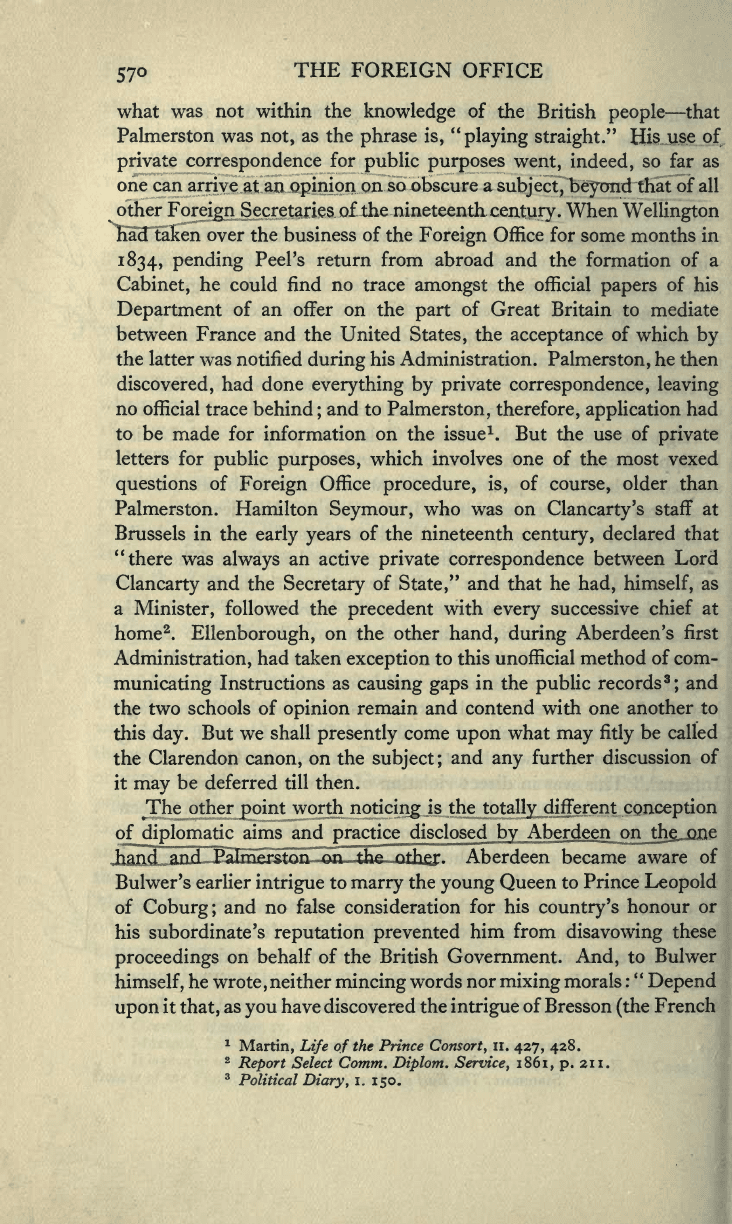
570
THE
FOREIGN
OFFICE
what
was not within the
knowledge
of
the
British
people
—
that
Palmerston was
not,
as
the
phrase
is,
"playing
straight."
His
use of
private correspondence
for
public purposes
went, indeed,
so far as
one can
arrive
at
an
opinion
on so
obscure
a
subject,
beyond
that
of
all
other
Foreign
Secretaries
of
the nineteenth
century.
When
Wellington
had taken
over
the
business
of
the
Foreign
Office for
some
months
in
1834, pending
Peel's
return
from
abroad and the
formation
of a
Cabinet,
he could find
no
trace
amongst
the official
papers
of
his
Department
of
an
offer on
the
part
of
Great
Britain
to mediate
between
France and the United
States,
the
acceptance
of
which
by
the
latter was
notified
during
his Administration.
Palmerston,
he then
discovered,
had done
everything by
private correspondence, leaving
no
official trace
behind;
and to
Palmerston, therefore,
application
had
to
be
made for
information
on the issue
1
. But the
use of
private
letters for
public purposes,
which
involves
one of
the most vexed
questions
of
Foreign
Office
procedure,
is,
of
course,
older
than
Palmerston.
Hamilton
Seymour,
who was
on
Clancarty's
staff
at
Brussels in
the
early
years
of
the nineteenth
century,
declared that
"there was
always
an
active
private correspondence
between
Lord
Clancarty
and
the
Secretary
of
State,"
and
that
he
had,
himself,
as
a
Minister,
followed
the
precedent
with
every
successive chief
at
home
2
.
Ellenborough,
on
the other
hand,
during
Aberdeen's first
Administration,
had
taken
exception
to this
unofficial method
of com-
municating
Instructions
as
causing gaps
in
the
public
records
3
;
and
the
two schools
of
opinion
remain
and
contend
with one
another to
this
day.
But
we
shall
presently
come
upon
what
may
fitly
be called
the
Clarendon
canon,
on
the
subject;
and
any
further discussion
of
it
may
be
deferred till
then.
^The
other
point
worth
noticing
is
the
totally
different
conception
of
dip
lomatic
aims and
practice
disclosed
by
Aberdeen on
the-one
h
an
d
ar>
r!
Pqi™»ryt/w y" th°
other
Aberdeen became
aware of
Bulwer's
earlier
intrigue
to
marry
the
young
Queen
to
Prince
Leopold
of
Coburg;
and no false
consideration
for
his
country's
honour or
his subordinate's
reputation
prevented
him
from
disavowing
these
proceedings
on behalf of
the British
Government.
And,
to
Bulwer
himself,
he
wrote,
neither
mincing
words nor
mixing
morals
:
"
Depend
upon
it
that,
as
you
have discovered the
intrigue
of Bresson
(the
French
1
Martin,
Life
of
the
Prince
Consort,
11.
427,
428.
2
Report
Select Comm.
Diplom.
Service,
1861,
p.
211.
3
Political
Diary
,
1.
150.
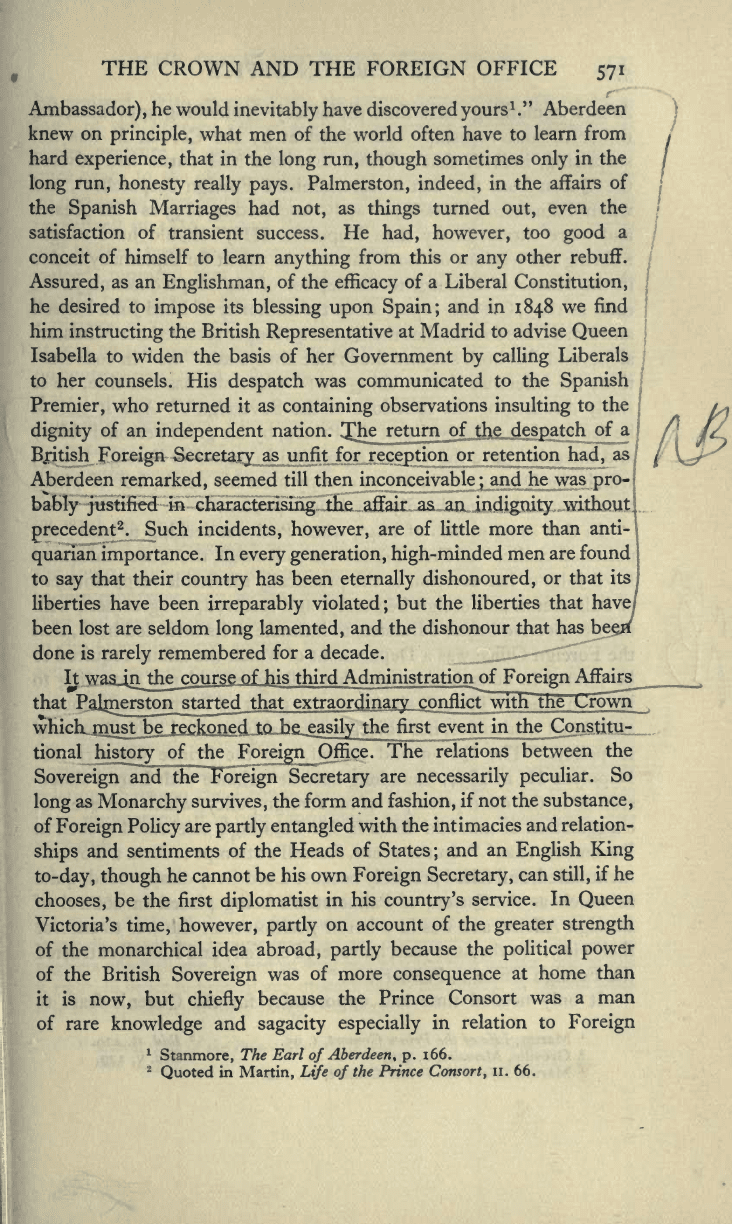
THE
CROWN
AND THE
FOREIGN
OFFICE
571
Ambassador),
he
would
inevitably
have
discovered
yours
1
."
Aberdeen
knew
on
principle,
what
men of
the world often
have
to
learn
from
hard
experience,
that
in
the
long
run,
though
sometimes
only
in the
long
run,
honesty really
pays.
Palmerston, indeed,
in
the
affairs
of
the
Spanish
Marriages
had
not,
as
things
turned
out,
even
the
satisfaction of
transient success.
He
had, however,
too
good
a
conceit
of
himself
to learn
anything
from
this
or
any
other
rebuff.
Assured,
as
an
Englishman,
of
the
efficacy
of
a
Liberal
Constitution,
he
desired to
impose
its
blessing
upon Spain;
and
in
1848
we
find
him
instructing
the
British
Representative
at Madrid
to advise
Queen
Isabella
to
widen the basis
of
her Government
by calling
Liberals
to
her
counsels. His
despatch
was
communicated to
the
Spanish
Premier,
who returned it
as
containing
observations
insulting
to
the
dignity
of an
independent
nation.
'
Xhe
return
of the
despatch
of
a
British
Foreign Secretary
as unfit
for
reception
or
retention
had,
as
Aberdeen
remarked,
seemed
till then
inconceivable;
and
he
was
pro
bably
justified
in
characterising
the
affair
as an
indignity
without
precedent
2
. Such
incidents,
however,
are
of
little more than
anti-
quarian importance.
In
every generation,
high-minded
men
are found
to
say
that their
country
has been
eternally
dishonoured,
or
that
its
liberties have been
irreparably
violated;
but
the liberties
that
have^
been
lost
are
seldom
long
lamented,
and
the
dishonour
that
has
beeri
done
is
rarely
remembered
for a
decade.
__—
—
It
wasJnjhe
course,.oLhis
third
Administration
o
fForeign
Affairs
that
Palrnerston
starte
d
that
extraordinary
conflict
witn
tne Crown
which must
jje
reckone
oLtCLbe^e
asily
the
first event
in the
Co
nstitur
....
tional hist
ory
of
th
e
Foreign
Office.
The
relations between
the
Sovereignand
the
Foreign
Secretary
are
necessarily peculiar.
So
long
as
Monarchy
survives,
the
form and
fashion,
if not the
substance,
of
Foreign
Policy
are
partly
entangled
with
the intimacies
and
relation-
ships
and sentiments
of
the
Heads
of
States
;
and
an
English
King
to-day,
though
he
cannot
be his
own
Foreign
Secretary,
can
still,
if he
chooses,
be
the first
diplomatist
in his
country's
service.
In
Queen
Victoria's
time, however,
partly
on account
of
the
greater
strength
of
the monarchical idea
abroad,
partly
because the
political
power
of
the British
Sovereign
was
of more
consequence
at home
than
it
is
now,
but
chiefly
because
the
Prince Consort
was
a man
of
rare
knowledge
and
sagacity
especially
in
relation
to
Foreign
1
Stanmore,
The Earl
of
Aberdeen,
p.
166.
Quoted
in
Martin, Life of
the
Prince
Consort,
11.
66.
rJ
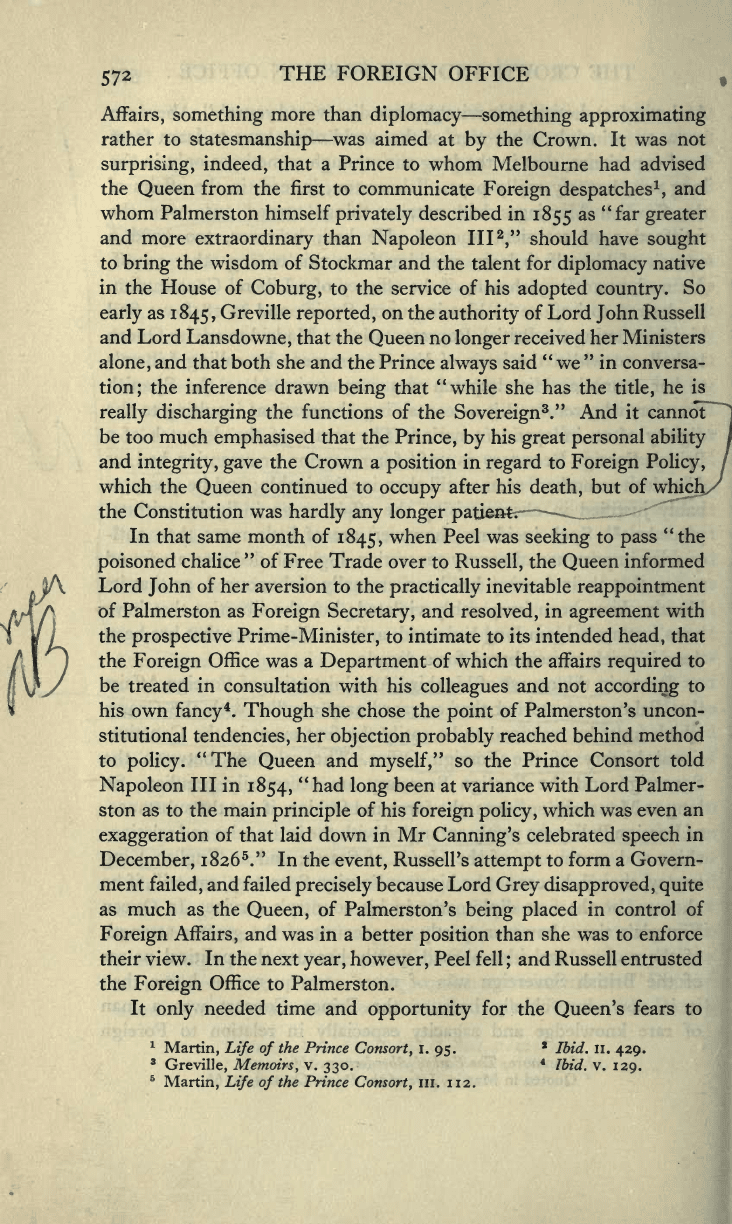
572
THE
FOREIGN
OFFICE
f
Affairs,
something
more than
diplomacy
—
something
approximating
rather to
statesmanship
—
was
aimed
at
by
the
Crown.
It
was
not
surprising,
indeed,
that
a
Prince
to whom
Melbourne
had
advised
the
Queen
from
the
first to communicate
Foreign
despatches
1
,
and
whom
Palmerston himself
privately
described
in
1855
as
"f
ar
greater
and
more
extraordinary
than
Napoleon
III
2
,"
should
have
sought
to
bring
the
wisdom of
Stockmar
and
the
talent
for
diplomacy
native
in
the
House
of
Coburg,
to the service of his
adopted country.
So
early
as
1845,
Greville
reported,
on the
authority
of Lord
John
Russell
and Lord
Lansdowne,
that the
Queen
no
longer
received her
Ministers
alone,
and
that both
she and
the Prince
always
said
"
we
"
in conversa-
tion;
the
inference
drawn
being
that
"while
she
has
the
title,
he
is
really
discharging
the
functions
of
the
Sovereign
3
." And
it
cannot"^
be
too much
emphasised
that
the
Prince,
by
his
great
personal ability
/
and
integrity, gave
the Crown a
position
in
regard
to
Foreign
Policy,
/
which
the
Queen
continued to
occupy
after
his
death,
but
of which
/
the Constitution
was
hardly any
longer
patienfcr
—
In
that same
month of
1845,
when Peel
was
seeking
to
pass
"the
poisoned
chalice
"
of
Free Trade over to
Russell,
the
Queen
informed
Lord
John
of her
aversion to
the
practically
inevitable
reappointment
of Palmerston
as
Foreign
Secretary,
and
resolved,
in
agreement
with
the
prospective
Prime-Minister,
to intimate to its
intended
head,
that
the
Foreign
Office was a
Department
of which
the
affairs
required
to
be
treated
in
consultation with
his
colleagues
and not
according
to
his own
fancy
4
.
Though
she chose
the
point
of
Palmerston's
uncon-
stitutional
tendencies,
her
objection probably
reached behind
method
to
policy.
"The
Queen
and
myself,"
so
the
Prince
Consort told
Napoleon
III
in
1854,
"had
long
been
at
variance with
Lord
Palmer-
ston
as
to the
main
principle
of his
foreign
policy,
which was
even
an
exaggeration
of
that
laid down in Mr
Canning's
celebrated
speech
in
December,
1826
5
."
In
the
event,
Russell's
attempt
to
form a
Govern-
ment
failed,
and
failed
precisely
because Lord
Grey
disapproved, quite
as
much
as the
Queen,
of
Palmerston's
being
placed
in control
of
Foreign
Affairs,
and
was in a
better
position
than
she
was
to
enforce
their
view.
In
the
next
year,
however,
Peel fell
;
and Russell entrusted
the
Foreign
Office
to
Palmerston.
It
only
needed
time and
opportunity
for the
Queen's
fears
to
1
Martin, Life
of
the
Prince
Consort,
1.
95.
*
Ibid.
n.
429.
3
Greville, Memoirs,
v.
330.
*
Ibid. v.
129.
5
Martin, Life
of
the Prince
Consort,
ill. 112.
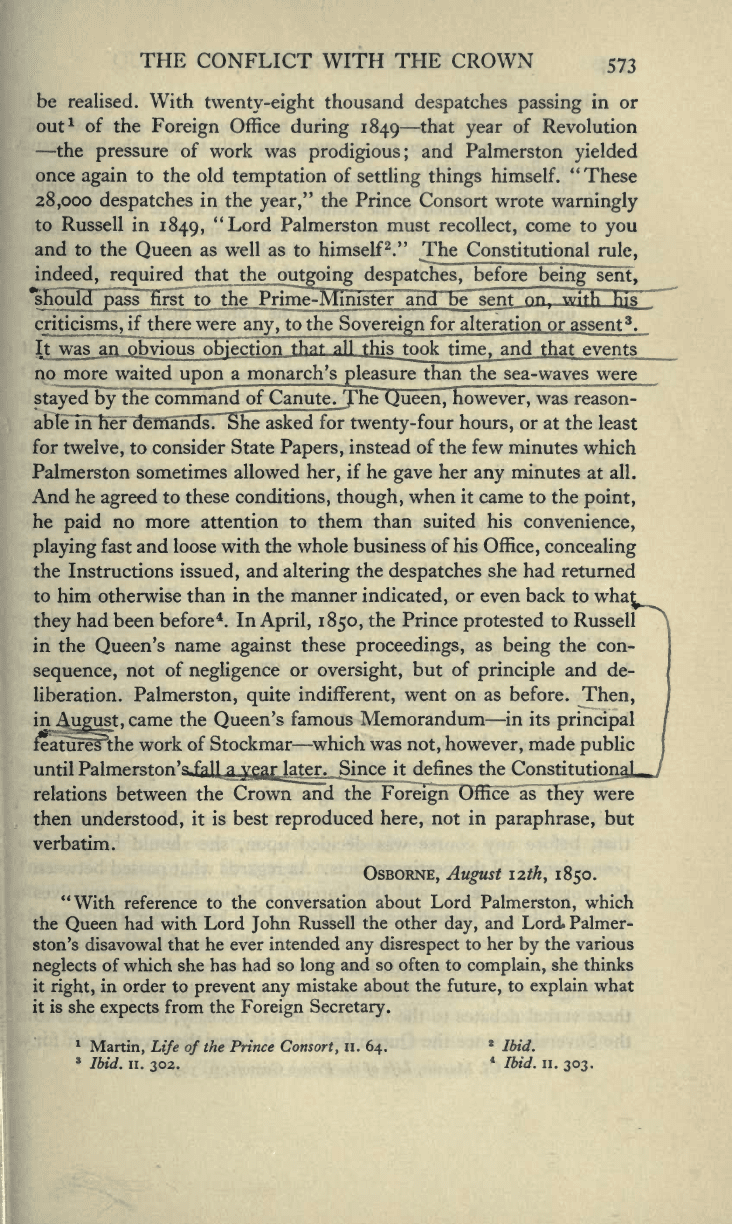
THE
CONFLICT WITH
THE CROWN
573
be realised.
With
twenty-eight
thousand
despatches passing
in or
out
1
of
the
Foreign
Office
during
1849
—
that
year
of
Revolution
—
the
pressure
of
work
was
prodigious;
and
Palmerston
yielded
once
again
to
the old
temptation
of
settling things
himself. "These
28,000
despatches
in
the
year,"
the
Prince
Consort
wrote
warningly
to Russell in
1849,
"Lord
Palmerston must
recollect,
come to
you
and
to the
Queen
as well as
to
himself
2
."
The
Constitutional
rule,
indeed,
required
that the
outgoing
despatches,
before
being
s
ent,
"should
pass
fi
rst to the Prime-Minister
and
be
sent
"",
with
fag
criticisms,
if
there
were
any,
to the
Sovereign
for
alteration
or assent
3
.
It
w
as
ajaZobvious
ob
fofipn,
that
all
thisj
ook
time,
and
that
events
no more
waited
up
on a
monarch's
plea
sure
th
an
the sea-waves
were
stayed by
the
comman
d of
Canute.
J
he
Queen,
however,
was reason-
ablelnllef dernands. She
asked
for
twenty-four
hours,
or
at
the
least
for
twelve,
to
consider State
Papers,
instead of the few
minutes
which
Palmerston sometimes
allowed
her,
if
he
gave
her
any
minutes
at all.
And he
agreed
to these
conditions,
though,
when
it came to the
point,
he
paid
no
more attention
to them
than
suited
his
convenience,
playing
fast
and loose with the
whole business of his
Office,
concealing
the
Instructions
issued,
and
altering
the
despatches
she
had
returned
to him
otherwise
than
in
the
manner
indicated,
or
even
back
to
what^
they
had been before
4
.
In
April, 1850,
the Prince
protested
to Russell
\
in
the
Queen's
name
against
these
proceedings,
as
being
the con-
sequence,
not
of
negligence
or
oversight,
but
of
principle
and
de-
liberation.
Palmerston,
quite
indifferent,
went
on as
before.
Then,
in
A
ugust
,
came the
Queen's
famous Memorandum
—
in
its
principal
featuTeTt-he
work
of
Stockmar
—
which was
not, however,
made
public
until
Pa1merstnn'
s_faH
a
ygaj
later. Since it defines
the
Constitution
relations between the
Crown
and the
Foreign
Office as
they
were
then
understood,
it
is best
reproduced
here,
not
in
paraphrase,
but
verbatim.
Osborne,
August
12th,
1850.
"With
reference to
the conversation
about
Lord
Palmerston,
which
the
Queen
had
with
Lord
John
Russell
the other
day,
and Lord. Palmer-
ston's
disavowal that
he ever
intended
any disrespect
to
her
by
the
various
neglects
of which
she
has had
so
long
and
so
often to
complain,
she thinks
it
right,
in
order
to
prevent
any
mistake about
the
future,
to
explain
what
it is
she
expects
from the
Foreign
Secretary.
1
Martin,
Life of
the
Prince
Consort,
u.
64.
*
Ibid.
3
Ibid. 11.
302.
*
Ibid. 11.
303.
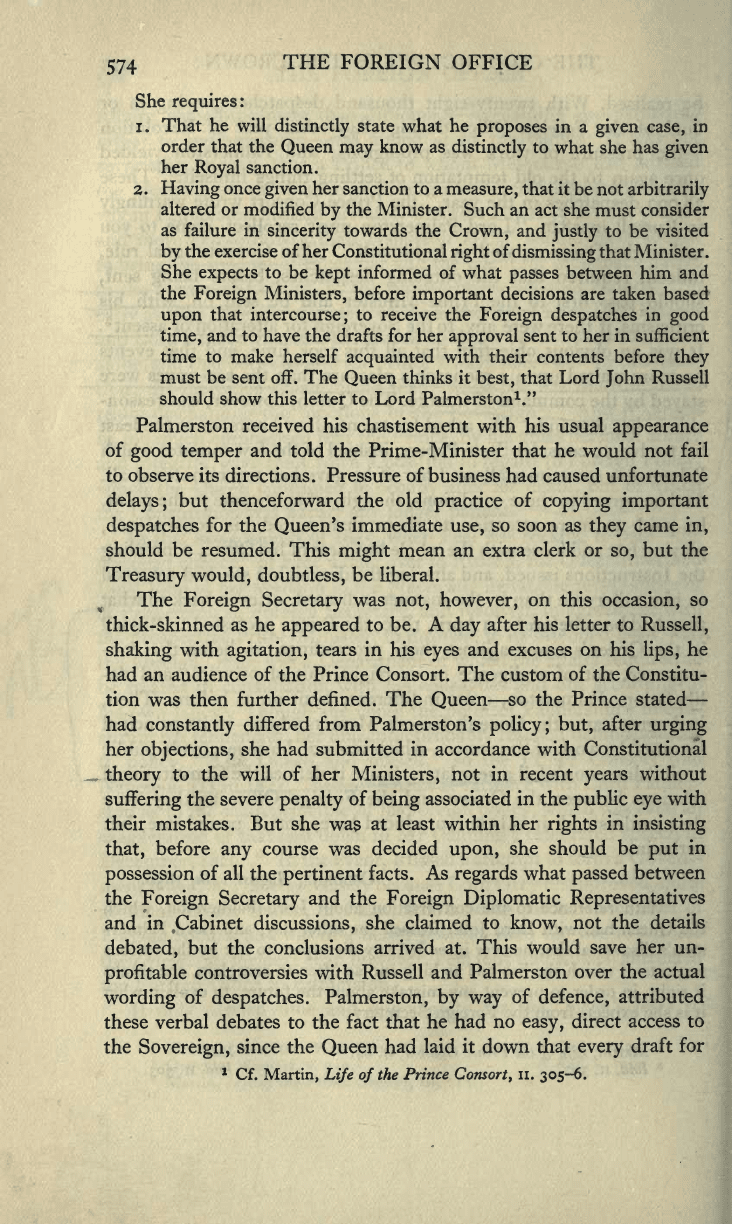
574
THE
FOREIGN
OFFICE
She
requires:
i.
That
he
will
distinctly
state
what
he
proposes
in a
given
case,
in
order
that
the
Queen
may
know as
distinctly
to
what she
has
given
her
Royal
sanction.
2.
Having
once
given
her
sanction
to a
measure,
that it be not
arbitrarily
altered or
modified
by
the Minister. Such an act
she must consider
as
failure
in
sincerity
towards the
Crown,
and
justly
to be visited
by
the exercise of
her Constitutional
right
of
dismissing
that Minister.
She
expects
to be
kept
informed of
what
passes
between him
and
the
Foreign
Ministers,
before
important
decisions are taken based
upon
that
intercourse;
to
receive
the
Foreign
despatches
in
good
time,
and to
have the drafts for her
approval
sent
to
her in sufficient
time
to make
herself
acquainted
with their contents before
they
must
be
sent
off.
The
Queen
thinks it
best,
that
Lord
John
Russell
should
show this letter
to Lord
Palmerston
1
."
Palmerston received
his chastisement with his
usual
appearance
of
good temper
and told the Prime-Minister that he would not
fail
to
observe
its directions. Pressure
of business
had
caused unfortunate
delays;
but
thenceforward
the old
practice
of
copying
important
despatches
for
the
Queen's
immediate
use,
so soon as
they
came
in,
should
be
resumed. This
might
mean an
extra clerk
or
so,
but the
Treasury
would, doubtless,
be liberal.
The
Foreign Secretary
was
not,
however,
on
this
occasion,
so
thick-skinned
as
he
appeared
to be.
A
day
after his
letter to
Russell,
shaking
with
agitation,
tears
in
his
eyes
and excuses
on
his
lips,
he
had
an
audience
of
the Prince Consort. The
custom
of
the Constitu-
tion
was then further defined.
The
Queen
—
so
the
Prince stated
—
had
constantly
differed
from Palmerston's
policy;
but,
after
urging
her
objections,
she had
submitted
in
accordance with
Constitutional
theory
to the will
of
her
Ministers,
not
in
recent
years
without
suffering
the severe
penalty
of
being
associated
in the
public eye
with
their
mistakes. But she
was
at least within
her
rights
in
insisting
that,
before
any
course was
decided
upon,
she
should
be
put
in
possession
of all
the
pertinent
facts.
As
regards
what
passed
between
the
Foreign
Secretary
and the
Foreign
Diplomatic Representatives
and in
.Cabinet discussions,
she
claimed
to
know,
not the details
debated,
but the
conclusions
arrived at.
This
would
save her
un-
profitable
controversies with
Russell
and Palmerston
over
the actual
wording
of
despatches.
Palmerston,
by way
of
defence,
attributed
these
verbal
debates to the fact that he
had
no
easy,
direct
access
to
the
Sovereign,
since the
Queen
had laid it down
that
every
draft
for
1
Cf.
Martin, Life of
the
Prince
Consort,
n.
305-6.
